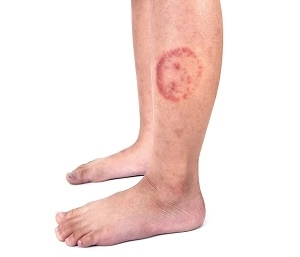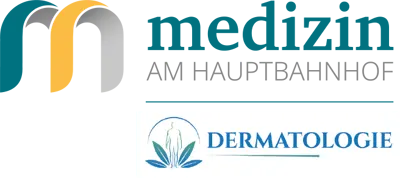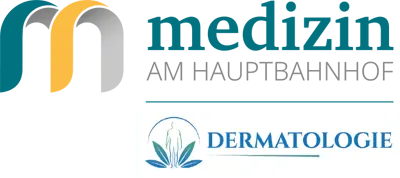 FUNGAL SKIN INFECTION
FUNGAL SKIN INFECTION
FUNGAL SKIN INFECTIONS ARE A PERSISTENT PROBLEM FOR THOSE AFFECTED. FUNGI CAN INFECT VARIOUS BODY PARTS AND DIAGNOSIS CAN OFTEN TAKE TIME.
FIND OUT WHAT YOU CAN DO ABOUT IT HERE.
Photo: Abobe.stock Phanasitti
-
What is a fungal skin infection?
-
How does a fungal skin infection manifest itself?
-
How does infection occur?
-
What encourages the development of a fungal infection?
-
How contagious is a fungal infection?
-
Which areas of the body can be affected?
-
How can a fungal skin infection be diagnosed?
-
Is there a faster way to get a diagnosis?
-
How can I protect myself?
-
What type of treatment is available?
What is a fungal skin infection?
Fungi or dermatomycoses include all fungi of the skin and skin appendages (nails and hair). There are several types of fungi that can affect humans. The most common types are:
- Dermatophytes
- Yeast fungus
- Mould fungus
Fungus can also be classified according to their appearance.
Zoophilic dermatophytes predominantly affect animals, much less often humans. Transmission from guinea pigs to humans has been partially observed. Likewise, patients who go on vacation in southern countries and have contact with street or wild dogs can also be infected.
Anthropophilic dermatophytes, on the other hand, affect humans. With this type, infection can be spread from person to person, as in the case of athlete's foot.
Geophilic dermatophytes normally live in the ground but can also affect humans.
How does a fungal skin infection manifest itself?
Most of the time, the affected areas of the skin experience itching, burning and redness. Very often marginal scaling occurs, as well as other skin changes such as pustules.
How does infection occur?
Types of infection are dependent on the type of fungus and the affected area. A fungal infection can be transmitted from person to person or through contaminated objects. As mentioned above, animals can also be a source of infection.
What encourages the development of a fungal infection?
Age is a risk factor because older patients are more likely to be affected. In the case of underlying diseases such as diabetes or circulatory disorders, fungal infections can occur more often. Warm, moist areas (groin, armpits, or the inside of shoes) offer optimal conditions for fungi to multiply.
How contagious is a fungal infection?
That depends on the type of fungi. Infection occurs via fungal spores, the so-called germ cells of the fungi. As a rule, contact can quickly lead to infection under appropriate conditions.
Which areas of the body can be affected?
In principle, any area of the body can be affected. Often you will find fungi (e.g., Candida) in the groin, armpits, or other skin folds. Typical areas that are also very often infected by fungi are the head, feet, and nails. In diabetics, the candida fungus can also appear in other places.
Book your appointment in our practice in Vienna here
How can a fungal skin infection be diagnosed?
Since a fungus usually does not heal by itself and can spread to other areas of the healthy skin, you should seek medical help in the event of noticeable skin alternations in order to start treatment as soon as possible. The fungus leads to recognisable changes to skin and is treated by the dermatologist as part of an overall approach.
The exact fungus species can be determined by a fungus culture. Resistance is also determined as part of the investigation. This means that treatment can be tailored to the fungal species that are detected. But there are also other skin disorders that, at first glance, may look like a fungus, e.g., pityriasis rosea or psoriasis.
Sometimes a fungus is also the first indication of another systemic disease, such as diabetes mellitus or a circulatory disorder. It is therefore important that a full assessment is conducted to determine the exact cause.
Is there a faster way to get a diagnosis?
Usually, a lot of time must be allowed for an accurate diagnosis of a fungal culture. It can take up to six weeks for a laboratory result to be available.
With the brand-new pathogen-specific method of EUROArray Dermatomycosis, an accurate diagnosis can be achieved within a few days. The findings are received promptly, and treatment can begin immediately. A molecular biological method is used here, in which one can even obtain information about the sources of infection and the carriers of the fungus (e.g., human or animal carriers). This can be an important success factor for the subsequent treatment plan.
From March 2021, Derma Wien will become the first doctor’s surgery in Austria to offer this expedited diagnosis. We have purchased a special device for this, and the sample is analysed for you directly in the practice.
This diagnostic method can also be used for other fungal diseases.
Cost estimate: 220 € (not covered by health insurance)
How can I protect myself?
The best way to protect yourself is to avoid contact with the pathogen.
There are some simple measures you can take to protect yourself against (re) infection.
These are:
-Avoiding non-breathable (synthetic) clothing, shoes, and socks
-Daily change of clothes
-Wear cotton socks and wash at 60 ° C
-Wearing bathing shoes in public facilities (sauna, fitness studios, swimming pools)
-Good drying of the feet, also between the toes
-Avoid contact with unknown animals
What type of treatment is available?
Depending on the affected part of the body and its severity, local or systemic treatment with antimycotics (antifungal agents) is possible. Often, both tablets and a cream for external use are prescribed.
It is important to initiate a suitably specific treatment, as some fungal species are resistant to certain drugs.



